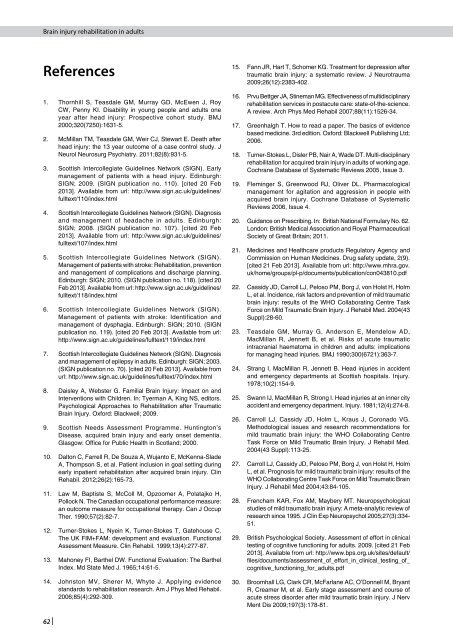sign130
sign130
sign130
You also want an ePaper? Increase the reach of your titles
YUMPU automatically turns print PDFs into web optimized ePapers that Google loves.
Brain injury rehabilitation in adults<br />
References<br />
1. Thornhill S, Teasdale GM, Murray GD, McEwen J, Roy<br />
CW, Penny KI. Disability in young people and adults one<br />
year after head injury: Prospective cohort study. BMJ<br />
2000;320(7250):1631-5.<br />
2. McMillan TM, Teasdale GM, Weir CJ, Stewart E. Death after<br />
head injury: the 13 year outcome of a case control study. J<br />
Neurol Neurosurg Psychiatry. 2011;82(8):931-5.<br />
3. Scottish Intercollegiate Guidelines Network (SIGN). Early<br />
management of patients with a head injury. Edinburgh:<br />
SIGN; 2009. (SIGN publication no. 110). [cited 20 Feb<br />
2013]. Available from url: http://www.sign.ac.uk/guidelines/<br />
fulltext/110/index.html<br />
4. Scottish Intercollegiate Guidelines Network (SIGN). Diagnosis<br />
and management of headache in adults. Edinburgh:<br />
SIGN; 2008. (SIGN publication no. 107). [cited 20 Feb<br />
2013]. Available from url: http://www.sign.ac.uk/guidelines/<br />
fulltext/107/index.html<br />
5. Scottish Intercollegiate Guidelines Network (SIGN).<br />
Management of patients with stroke: Rehabilitation, prevention<br />
and management of complications and discharge planning.<br />
Edinburgh: SIGN; 2010. (SIGN publication no. 118). [cited 20<br />
Feb 2013]. Available from url: http://www.sign.ac.uk/guidelines/<br />
fulltext/118/index.html<br />
6. Scottish Intercollegiate Guidelines Network (SIGN).<br />
Management of patients with stroke: Identification and<br />
management of dysphagia. Edinburgh: SIGN; 2010. (SIGN<br />
publication no. 119). [cited 20 Feb 2013]. Available from url:<br />
http://www.sign.ac.uk/guidelines/fulltext/119/index.html<br />
7. Scottish Intercollegiate Guidelines Network (SIGN). Diagnosis<br />
and management of epilepsy in adults. Edinburgh: SIGN; 2003.<br />
(SIGN publication no. 70). [cited 20 Feb 2013]. Available from<br />
url: http://www.sign.ac.uk/guidelines/fulltext/70/index.html<br />
8. Daisley A, Webster G. Familial Brain Injury: Impact on and<br />
Interventions with Children. In: Tyerman A, King NS, editors.<br />
Psychological Approaches to Rehabilitation after Traumatic<br />
Brain Injury. Oxford: Blackwell; 2009.<br />
9. Scottish Needs Assessment Programme. Huntington’s<br />
Disease, acquired brain injury and early onset dementia.<br />
Glasgow: Office for Public Health in Scotland; 2000.<br />
10. Dalton C, Farrell R, De Souza A, Wujanto E, McKenna-Slade<br />
A, Thompson S, et al. Patient inclusion in goal setting during<br />
early inpatient rehabilitation after acquired brain injury. Clin<br />
Rehabil. 2012;26(2):165-73.<br />
11. Law M, Baptiste S, McColl M, Opzoomer A, Polatajko H,<br />
Pollock N. The Canadian occupational performance measure:<br />
an outcome measure for occupational therapy. Can J Occup<br />
Ther. 1990;57(2):82-7.<br />
12. Turner-Stokes L, Nyein K, Turner-Stokes T, Gatehouse C.<br />
The UK FIM+FAM: development and evaluation. Functional<br />
Assessment Measure. Clin Rehabil. 1999;13(4):277-87.<br />
13. Mahoney FI, Barthel DW. Functional Evaluation: The Barthel<br />
Index. Md State Med J. 1965;14:61-5.<br />
14. Johnston MV, Sherer M, Whyte J. Applying evidence<br />
standards to rehabilitation research. Am J Phys Med Rehabil.<br />
2006;85(4):292-309.<br />
62 |<br />
15. Fann JR, Hart T, Schomer KG. Treatment for depression after<br />
traumatic brain injury: a systematic review. J Neurotrauma<br />
2009;26(12):2383-402.<br />
16. Prvu Bettger JA, Stineman MG. Effectiveness of multidisciplinary<br />
rehabilitation services in postacute care: state-of-the-science.<br />
A review. Arch Phys Med Rehabil 2007;88(11):1526-34.<br />
17. Greenhalgh T. How to read a paper. The basics of evidence<br />
based medicine. 3rd edition. Oxford: Blackwell Publishing Ltd;<br />
2006.<br />
18. Turner-Stokes L, Disler PB, Nair A, Wade DT. Multi-disciplinary<br />
rehabilitation for acquired brain injury in adults of working age.<br />
Cochrane Database of Systematic Reviews 2005, Issue 3.<br />
19. Fleminger S, Greenwood RJ, Oliver DL. Pharmacological<br />
management for agitation and aggression in people with<br />
acquired brain injury. Cochrane Database of Systematic<br />
Reviews 2006, Issue 4.<br />
20. Guidance on Prescribing. In: British National Formulary No. 62.<br />
London: British Medical Association and Royal Pharmaceutical<br />
Society of Great Britain; 2011.<br />
21. Medicines and Healthcare products Regulatory Agency and<br />
Commission on Human Medicines. Drug safety update, 2(9).<br />
[cited 21 Feb 2013]. Available from url: http://www.mhra.gov.<br />
uk/home/groups/pl-p/documents/publication/con043810.pdf<br />
22. Cassidy JD, Carroll LJ, Peloso PM, Borg J, von Holst H, Holm<br />
L, et al. Incidence, risk factors and prevention of mild traumatic<br />
brain injury: results of the WHO Collaborating Centre Task<br />
Force on Mild Traumatic Brain Injury. J Rehabil Med. 2004(43<br />
Suppl):28-60.<br />
23. Teasdale GM, Murray G, Anderson E, Mendelow AD,<br />
MacMillan R, Jennett B, et al. Risks of acute traumatic<br />
intracranial haematoma in children and adults: implications<br />
for managing head injuries. BMJ 1990;300(6721):363-7.<br />
24. Strang I, MacMillan R, Jennett B. Head injuries in accident<br />
and emergency departments at Scottish hospitals. Injury.<br />
1978;10(2):154-9.<br />
25. Swann IJ, MacMillan R, Strong I. Head injuries at an inner city<br />
accident and emergency department. Injury. 1981;12(4):274-8.<br />
26. Carroll LJ, Cassidy JD, Holm L, Kraus J, Coronado VG.<br />
Methodological issues and research recommendations for<br />
mild traumatic brain injury: the WHO Collaborating Centre<br />
Task Force on Mild Traumatic Brain Injury. J Rehabil Med.<br />
2004(43 Suppl):113-25.<br />
27. Carroll LJ, Cassidy JD, Peloso PM, Borg J, von Holst H, Holm<br />
L, et al. Prognosis for mild traumatic brain injury: results of the<br />
WHO Collaborating Centre Task Force on Mild Traumatic Brain<br />
Injury. J Rehabil Med 2004;43:84-105.<br />
28. Frencham KAR, Fox AM, Maybery MT. Neuropsychological<br />
studies of mild traumatic brain injury: A meta-analytic review of<br />
research since 1995. J Clin Exp Neuropsychol 2005;27(3):334-<br />
51.<br />
29. British Psychological Society. Assessment of effort in clinical<br />
testing of cognitive functioning for adults. 2009. [cited 21 Feb<br />
2013]. Available from url: http://www.bps.org.uk/sites/default/<br />
files/documents/assessment_of_effort_in_clinical_testing_of_<br />
cognitive_functioning_for_adults.pdf<br />
30. Broomhall LG, Clark CR, McFarlane AC, O’Donnell M, Bryant<br />
R, Creamer M, et al. Early stage assessment and course of<br />
acute stress disorder after mild traumatic brain injury. J Nerv<br />
Ment Dis 2009;197(3):178-81.


